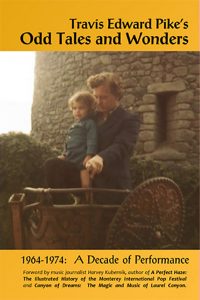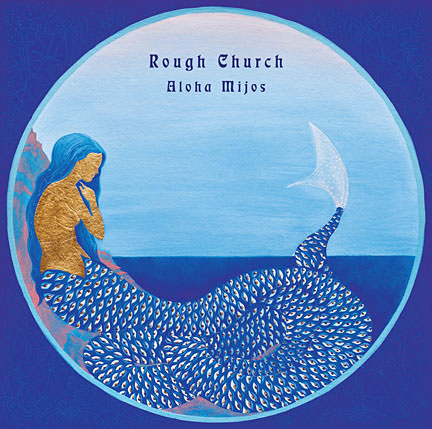HK: What was your initial approach when you first started thinking about doing this album?
TP: We didn’t begin with an album in mind. Adam was interested in three long-form pieces from the 70’s and 80’s that I’d never quite completed, “Andalusian Bride Suite,” “Otherworld March,” and “Witch,” so we recorded them.
HK: And what made you title it, “Outside the Box?”
TP: Originally, I planned to call it “Odds and Endings,” to tie in with my book, “Odd Tales and Wonders 1964-1974 A Decade of Performance,” the idea being that with this album, all the songs from my back catalog would finally be recorded, and I had successfully reached the “ending.” But “ending” sounded like forever, and to finish the album, I’d just written and recorded several new songs. My “ending” resulted in a new beginning. It wasn’t until this year, as we were finishing up the recordings, that I decided to change the album title to “Outside the Box,” and for three good reasons. One, I’m not dead yet, so I’m still outside that box. Two, all my old songs are now “out of the box,” recorded and available to the public. And three, all my life I’d been told that I didn’t fit into a pre-defined marketing niche, a popular genre that the major labels would know how to market. As far as the recording industry is concerned, I’ve always been “Outside the Box.” Admittedly, marketing me is a nightmare. For one thing, I’m 71- years-old – not exactly in the demographic that the music industry caters to, but I’m not licked yet. I had an itch to find a niche, and now I’ve found it. I’m a singer-songwriter, a niche that may still be “outside the box,” but a niche I’m proud to own.
HK: You had just released a retrospective series of albums from your archives. Did you feel you had to do something in 2015 and early 2016 as a balancing act?
TP: Not really. I still had a few exotic pieces in my back catalog that Adam and I thought deserved to be brought into the world, and three years of recording had inspired me to write a few new songs. By the time we finished laying down the “Andalusian Bride Suite” and “Otherworld March,” I realized I was only a few songs short of a new album, so I went to work adapting and updating a few old songs and wrote a few completely new ones.
HK: I want to talk about them, the three songs that triggered this new album. In the “Andalusian Bride” you talk about setting yourself free, but it’s a song about marriage and commitment, isn’t it?
TP: The bride’s rite of passage is symbolic of every woman’s coming of age. A girl, reared in a walled garden from which even the clouds are banished, cannot remain a child forever. She must, one day, go beyond the wall, out into the wild and wondrous world beyond. Her bid for freedom comes as no surprise. There has always been a gate in the garden, a gate through which she is expected to pass. The Child must become The Mother.
 This is not to say that she must literally marry or become a mother, but that she must set out on her own path to fulfillment, wherever that may take her. Her leave-taking is bittersweet. She feels it most deeply when she leaves her childhood companion behind. Unlike the gods and goddesses who nurtured her, not understanding why she leaves, the unicorn stands alone in the garden, crying. When a girl crosses that threshold to adulthood, horns and trumpets should proclaim it. She has become mistress of her own destiny. I set the piece in Southern Spain. Andalusia displays an historical heritage practically unequaled in the West.
This is not to say that she must literally marry or become a mother, but that she must set out on her own path to fulfillment, wherever that may take her. Her leave-taking is bittersweet. She feels it most deeply when she leaves her childhood companion behind. Unlike the gods and goddesses who nurtured her, not understanding why she leaves, the unicorn stands alone in the garden, crying. When a girl crosses that threshold to adulthood, horns and trumpets should proclaim it. She has become mistress of her own destiny. I set the piece in Southern Spain. Andalusia displays an historical heritage practically unequaled in the West.
Known to Phoenicians and Ancient Greeks, its own historical records begin with Carthaginian colonization, and continue with conquest by Rome, the Vandals, the Visigoths, and the Moors, who held it from the early 8 th century until the Spanish Reconquista in 1492. Mythological references were introduced by each successive wave of conquerors.
Sonically, Andalusian Bride is built on a foundation of North-African walking drum and strummed Spanish guitar, bringing in other instruments and tonalities reflective of Andalusia’s many cultural associations.
HK: Tell me about the “Otherworld March.”
TP: That’s easy. It has had many names over the years, and it only became the “Otherworld March” last year, when we began recording it. My symphonic poem period was pretty much concurrent with my rock opera period, so I originally composed and orchestrated it in 1974. Fortunately, I’d kept the notation all these years, in the hope that one day I would hear it performed, and now, thanks to Adam, I have.
HK: What inspired it? Does it have something to do with your time in the military?
TP: No. It’s a quick-time march, I wrote when I was still contemplating a return to live performance. I suppose it’s an “otherworldly” ballet piece. I intended it to be a choreographed showpiece with red follow spots tracking sexy dancers, writhing and swirling across a fog-bound stage. I planned to have pyrotechnic explosions chase the dancers from the stage and finally, out of all the smoke and fog, I would appear. I had considered adding a cannonade, but in the end, I decided the repeated diabolis in musica sufficed.
HK: I’d like to have seen that.
TP: I’d like to have done it.
HK: That brings us to “Witch.” “Witch” is pretty dark for you, isn’t it? How did that develop? And why did you take the spoken parts of the Inquisitors and bring in three female vocalists to sing the song? Who are they and what do they represent?
TP: That’s a lot of questions, to have all rolled into one, but all right. I wrote “Changeling,” my original occult rock musical, in 1974. A deeply researched work, I had spent most of a year studying medieval witch trials, and composed “Witch” for that work. “Changeling” evolved into “Morningstone,” and the song was cut when it no longer served the story line.
The horrors of the Central European war between Catholics and Protestants (1618-1638), in which Biblical passages were quoted to sanctify witch-burnings, is condemned by modern Christianity. Sadly, the religious schism between Shi’ite and Sunni Muslims has given rise to modern-day terrorists who cite verses from the Quran to support their atrocities, making “Witch” relevant again, as a warning against the potential horror inherent in extremist theocracies. As for the three ladies who sing the song, in ages past they would be readily understood to represent the Furies, female spirits of justice and vengeance for crimes against nature. And as for the Inquisitor, who, better than I, to dramatically render his justifications and sentences?
Furies, female spirits of justice and vengeance for crimes against nature. And as for the Inquisitor, who, better than I, to dramatically render his justifications and sentences?
HK: I don’t get many answers like that from the celebrities I normally interview. Will there be a quiz?
TP: I thought I was the one taking the quiz.
HK: Well, as far as I’m concerned, you passed. But I want you to talk about bringing in David Pinto to play the Baroque keyboard parts for “Witch.” You’ve worked with him for years.
TP: David’s been a friend since 1973 or so, and we first worked together on, of all things, “Witch.” He is an extraordinary talent, and all of his performances for “Witch” have been extraordinary. It was only natural that for this recording, that I should go back to the master who had played the keyboard parts so well before. And if I may, I’d like to take this opportunity to say that David, in addition to his many credits as musician, educational specialist, and developer of award-winning music software for the blind, is the Founder and Chairman of the Board of the Academy of Music for the Blind, an exceptionally worthy non-profit organization I am personally proud to support.
HK: Okay, only two more questions. Tell me about “Star Maker.” When you started singing and recording, it was still a two-track analog world. In this song, you contrast the old music business paradigm with an uncertain new reality, less dependent on radio play and record stores than on the internet. Are you annoyed, amused or unconcerned about today’s music climate and the routes to retail exposure and sales?
TP: I’m perplexed. I know the old school ways, where radio play resulted in record sales, but I am not convinced I know how to market music in this brave new world. I don’t even know if it’s possible for an old retread like me to get any traction in this youth-driven market, promoted through social media and delivered via the internet.
HK: And one more. I have to ask you about “Lovely Girl I Married.” Did this tune first begin the day you met your wife, Judy? Or did it stem from a more recent situation where you reflected on this still very strong relationship you have with her?
TP: The song does harken back to the first day I met her, but I wrote and recorded the song last year (2015), and it is meant to be a sincere and deep-rooted consideration of all she means to me, and the enduring happiness and comfort of the life we’ve shared.
HK: Did you have any hesitation in spilling out your feelings to her? It’s not a graphic composition, but what is it like, writing this sort of song, when you live with the person it is about?
TP: Judy is both my best friend and my forever bride. I love her, and tell her so at least once a day, so saying it in a song is not at all awkward. It’s about us. And she loves it!
HK: I guess that says it all. In closing, I want to add that it's interesting watching the Pike brothers collaborate together in the studio. They have a unique musical bond. There is a 21-year age difference between Travis and his youngest brother, Adam, but watching them record, it doesn’t seem that a fifth of a century divides them. This new album, “Outside the Box,” featuring several new songs, is not only their most eclectic album to date, it’s one of their best.
http://www.long-grin.com
http://www.grumpuss.com
http://www.morningstone.com
http://www.travisedwardpike.com
http://www.oddtalesandwonders.com
http://www.otherworldcottageindustries.com




